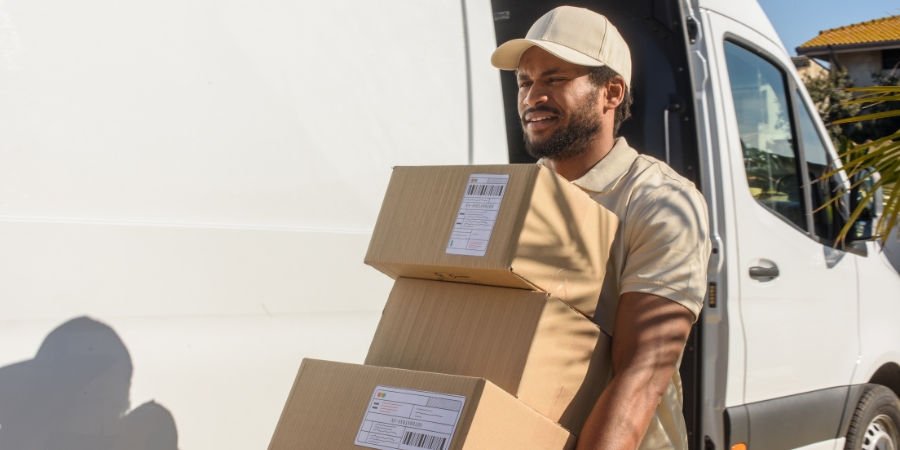
Photo: Canva
Can Retail Beat the Heat?
Target is allowing store employees to wear shorts as heat waves bake the South and Southwest. For other workers, presumably delivery personnel and warehouse workers, frequent water and rest breaks are being extended.
Studies have shown that climate change is making heat waves more frequent and more severe. Worker risks include heat stroke, heat exhaustion, and dehydration.
Taking the brunt of the heat is retail’s delivery force. OSHA (Occupational Safety and Health Administration) lists mail and package delivery as one of the primary industries where outdoor workers suffer from heat-related illnesses.
After a segment aired on Houston’s KHOU 11 showing a video of an Amazon delivery driver nearly collapsing, Amazon said it was adding up to two hours of breaks into delivery routes. Amazon drivers still claim that regulations requiring engines not to idle during stops prevent air conditioning from adequately cooling the vans.
USPS, with about 70% of its delivery vans without air conditioning, recently began starting shifts at 7:30 a.m. in Texas after a letter carrier died in 115-degree heat.
Indoors, warehouses generally have air conditioning, but ventilation often can’t handle excessive heat. “Most of these warehouses are sheet metal, and the sun radiates inside all day long,” Robert Moreno, a 30-year UPS warehouse employee, told CalMatters.
Amazon in a mid-June press release listed numerous steps it’s taking to keep drivers and warehouse workers safe from heat, including “air conditioning, plenty of rest time as well as best-in-class Amazon technology, amenities and preventative measures.”
UPS agreed to install air conditioning in all new, small package trucks as part of its new contract with workers that builds on recent moves to combat the heat, including new cooling gear and enhanced training.
Most U.S. workers have few legal protections related to extreme heat conditions, but federal guidelines are being developed, according to the Washington Post.
Some calls are being heard for hazard pay in times of excessive heat. One USPS worker said on a Reddit post, “Actions speak louder than words. If they really care about us, just give us hazard pay, and more break time during summer time.”
Discussion Questions
DISCUSSION QUESTIONS: What challenges do the heat waves present to U.S. retail? What are some obvious and less obvious ways retailers can protect workers from heat-related illnesses?



As someone from one of the hottest states in the nation, the heat causes many issues. Delivery workers need to have air conditioning in their trucks (not all do) and carry enough water and stop for regular breaks. That impacts route scheduling and planning. Anyone doing outdoor tasks, such as collecting carts from the parking lot, needs to be given protection from the sun in the form or hats, glasses, etc. And supply chains and warehousing need to be thought about as some goods perish or melt in the heat if left out.
Target’s solar panel installations over walkways / pickup lanes in the parking lots are a double win – keeps the direct sun off staff and guests, and reduces greenhouse gas emissions for store operations (and eventually, charging stations for guests’ vehicles, so a triple win). Good facility design won’t solve all problems, but it can definitely help.
I remember once reading a piece about the 1970’s oil crisis and office workers in Japan were asked not to wear ties as it meant the air conditioning could be set to a more efficient setting – thus saving energy.
I also recall working in a planning office of a factory in the early 1990’s with no air conditioning – during hot weather clothing standards were relaxed but also employees were issued with water bottles with ‘stay hydrated’ messages printed on them.
Small initiatives like these can be seen to be least intrusive and consequently more effective.
The heat will definitely have an impact on workers, especially those who spend time outdoors. Employers need to take into consideration that they will need time to cool down and require lots of hydration. Working in this heat is not just uncomfortable, it’s dangerous.
The hot weather also has a major affect on sales as foot steps slow. Mothers with children are on double duty running to the store and it’s not fun. Older generations will put off shopping, visiting stores only when it’s a necessity to purchase specific items. When it’s this hot people tend to shop in quick bursts, eager to get back to the AC.
Climate change presents a challenge to front line worker safety and all of the suggestions posited in the survey should be considered. Additionally, retailers should be modeling out how climate change will affect where, when, how, why consumers shop and what products they will seek out and drop in the future.
This post seems to sidestep an obvious question: at what point is it just plain unsafe for someone to be working (at least outside, or predominantly outside)?? The suggestions here are nice, I guess, as far as they go; but I don’t think any of them are sufficient in extreme conditions. Ultimately this is a medical issue…we should be seeking answers on ‘DoctorWire”, not ‘RetailWire’.
Obviously, there is a “heat wave” issue in all types of businesses. A relaxed dress code is a start. An educational session reminding people about hydration and the symptoms of heat-related illnesses is important. Employees should be aware of their co-workers and watch for symptoms. While none of these suggestions are new, the temperature issue is not making headlines almost daily.
Heat cannot be ignored and productivity goes down when you’re physically depleted. Providing cooling neck wraps, popsicles, cool water, and extra breaks can make a big difference for warehouse employees during the summer months. We have to listen to employee’s concerns and not ignore the health and safety of our workforce.